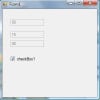Or you can access that directly from ts.Days in the above code.
jonsca 1,059 Quantitative Phrenologist Team Colleague Featured Poster
jonsca 1,059 Quantitative Phrenologist Team Colleague Featured Poster
jonsca 1,059 Quantitative Phrenologist Team Colleague Featured Poster
jonsca 1,059 Quantitative Phrenologist Team Colleague Featured Poster
jonsca 1,059 Quantitative Phrenologist Team Colleague Featured Poster
jonsca 1,059 Quantitative Phrenologist Team Colleague Featured Poster
jonsca 1,059 Quantitative Phrenologist Team Colleague Featured Poster
jonsca 1,059 Quantitative Phrenologist Team Colleague Featured Poster
jonsca 1,059 Quantitative Phrenologist Team Colleague Featured Poster
jonsca 1,059 Quantitative Phrenologist Team Colleague Featured Poster
jonsca 1,059 Quantitative Phrenologist Team Colleague Featured Poster
jonsca 1,059 Quantitative Phrenologist Team Colleague Featured Poster
jonsca 1,059 Quantitative Phrenologist Team Colleague Featured Poster
jonsca 1,059 Quantitative Phrenologist Team Colleague Featured Poster
jonsca 1,059 Quantitative Phrenologist Team Colleague Featured Poster
jonsca 1,059 Quantitative Phrenologist Team Colleague Featured Poster
jonsca 1,059 Quantitative Phrenologist Team Colleague Featured Poster
jonsca 1,059 Quantitative Phrenologist Team Colleague Featured Poster
jonsca 1,059 Quantitative Phrenologist Team Colleague Featured Poster
jonsca 1,059 Quantitative Phrenologist Team Colleague Featured Poster
jonsca 1,059 Quantitative Phrenologist Team Colleague Featured Poster
jonsca 1,059 Quantitative Phrenologist Team Colleague Featured Poster
jonsca 1,059 Quantitative Phrenologist Team Colleague Featured Poster
jonsca 1,059 Quantitative Phrenologist Team Colleague Featured Poster
tux4life commented: Good hints :) +6
jonsca 1,059 Quantitative Phrenologist Team Colleague Featured Poster
jonsca 1,059 Quantitative Phrenologist Team Colleague Featured Poster
jonsca 1,059 Quantitative Phrenologist Team Colleague Featured Poster
jonsca 1,059 Quantitative Phrenologist Team Colleague Featured Poster
jonsca 1,059 Quantitative Phrenologist Team Colleague Featured Poster
jonsca 1,059 Quantitative Phrenologist Team Colleague Featured Poster
jonsca 1,059 Quantitative Phrenologist Team Colleague Featured Poster
jonsca 1,059 Quantitative Phrenologist Team Colleague Featured Poster
jonsca 1,059 Quantitative Phrenologist Team Colleague Featured Poster
Ancient Dragon commented: good answer :) +25
jonsca 1,059 Quantitative Phrenologist Team Colleague Featured Poster
jonsca 1,059 Quantitative Phrenologist Team Colleague Featured Poster
